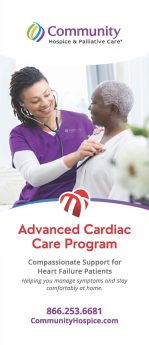
Community Hospice & Palliative Care, in collaboration with the National Partnership for Healthcare and Hospice Innovation (NPHI), offers the Advanced Cardiac Care Program to address one of the nation’s leading causes of death—heart disease. This program provides hospice care in the comfort of home, surrounded by the people and things you love most.
Helping You Manage the Symptoms You Face Most Often:
- Shortness of breath
- Chest pain
- Swelling in your arms, legs, or abdomen due to fluid build-up
- Feeling tired
- Persistent cough or congestion
- Loss of appetite or nausea
- Anxiety or restlessness
By helping to manage these symptoms—and guiding you through simple self-care techniques—we aim to help you avoid hospital or emergency room visits, while receiving care where you feel safest and most comfortable.
How do I know if this program is right for me?
If you’ve had frequent hospital stays, are on maximum heart medications, yet still experiencing symptoms like labored breathing, chest pain, swelling, or other heart-related challenges, it may be time to explore hospice support.
How can I learn more?
Reach out to us today to discuss options or consult with your doctor about initiating care through Community Hospice & Palliative Care’s Advanced Cardiac Care Program.
Click on the images below for details on how the program works:
What makes this program different from other hospice services?
To be eligible, patients must meet standard hospice criteria (a serious, life-limiting illness with a life expectancy of six months or less). In addition to traditional hospice support, the Advanced Cardiac Care Program includes:
Frequent Home Visits
Frequent home visits and calls from nurses with specialized training in cardiac symptom management
Your Care Team
A care team that includes clinical professionals with cardiac expertise
Medication Management
Medication management tailored to relieve symptoms and support your quality of life
Specialized Cardiac Protocols
Specialized cardiac protocols to monitor changes and prevent symptoms from worsening
Extra Support
Extra support from chaplains, social workers, nursing assistants, and volunteers for you and your loved ones
Patient Caregiver Guide
All participants also receive a Patient and Caregiver Booklet, which includes best practices for managing end-stage heart failure
More About the Home-Centered, Compassionate Approach
Imagine spending your final months not in clinical settings, but at home—surrounded by family, comfort, and the familiarity of your own surroundings. That’s the heart of what this program is all about. One patient shared:
“This (being at home) is much better than lying in a hospital bed, pressing a button and waiting for someone to come to you.”
In-home care enables patients to continue taking certain cardiac medications that provide relief—and enjoy frequent nurse visits, close symptom monitoring (including weight, blood pressure, and fluid retention), and meaningful conversations about advance care and end-of-life choices.
This approach helps manage symptoms, ease anxiety, and bring peace to both patients and families—even when a cure is no longer possible.



